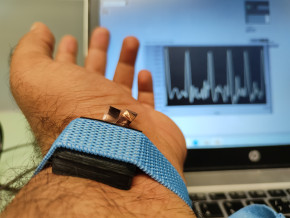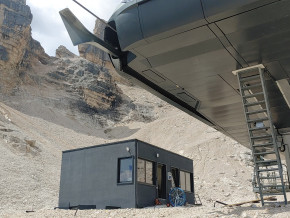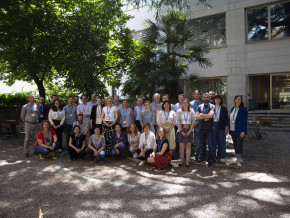How Did "Now" Arrive?
Eurac Research historian Georg Grote is a native of Germany who lived and worked in Ireland for 23 years before coming to South Tyrol. Alastair Fuad-Luke is a British co-designer and former ecologist who came to South Tyrol to teach at the unibz Faculty of Design and Art. Having recently arrived, they offer a fresh perspective on topics such as design activism, participatory democracy, and the urge to find a new story for the future of humankind not explicitly based on growth.
Professor Grote, I could not help but noticing that you arrived to the interview today in a Citroen DS—otherwise known in Italy as a ‘Squalo’. Are you a historian with a passion for design?
Grote: Oh yes, and in particular good historical design. When it comes to the Citroen DS, it has an extra appeal to me. The Squalo is a masterpiece created by the Italian industrial designer Flaminio Bertoni and the French aeronautical engineer André Lefèbvre: the best of Europe comes when individuals work together.
One of your research topics is ‘collective identity’ from a cultural and historical points of view. How do you define collective identity and what elements are included in it?
Grote: For example, there are certain characteristics that relate to all Germans of a particular period. Take me, for example: I was born in 1966 and grew up with the burden of having murdered six million Jews during the Second World War. This was part of the educational agenda in schools and reflected the zeitgeist. That burden became part of the collective memory of my generation. Germans of following generations have a different understanding now of what it means to be German. Guilt turned to responsibility, and reunification altered the collective mind once more. Collective identity changes over time, which is what makes the role of historians so important. We contextualise the present in the changing interpretations of the past.
Professor Alastair Fuad-Luke, you are teaching design at the unibz Faculty of Design and Art, but you are originally an ecologist. How did you arrive at this combination of fields?
Fuad-Luke: I used to run an ecological landscape design company in Great Britain in the 1980s, working with landscape architects and designers. In the late 1990s, I began specialising in ecological design of products and services. I realised around 2004 that while eco-efficiency is great, we really need to look at behavioural change, so I started to bring as many people as possible into the design process.
You’re talking about social design as a collective process? Which somehow brings us back to the collective identity…
Fuad-Luke: …or collective intelligence. Co-design, social design or ‘design activism’, as I prefer to call it, has a lot to do with participatory democracy. I bring together people from very different backgrounds and try to create an ownership of commonly understood challenges. I include historians, other professionals, and citizens as co-designers, as they help us to answer the important question of “how did the ‘now’ arrive”. Understanding this helps us formulate the right question of what we exactly need to design.
There is a certain idealism in what you are saying. Can we really be that democratic?
Fuad-Luke: No, we can’t. But we need to maintain a certain idealism if we want to create new stories that are not tied to the only story we are telling today: the Gross Domestic Product (GDP) and eternal economic growth. I put together local and newly-arrived citizens in Bolzano to share their expertise in making clothing. If you make something together, there is a certain dialogue that is formed. In the GDP hierarchisation, we seem to have lost this idea of helping each other. Everything is adversarial these days.
This are very concrete co-design projects on a micro level, which seems to be much easier compared to doing something on the macro level.
Fuad-Luke: Again, I do think that the most important thing in co-designing at any level is to find the right question. And then, if we can move between micro and macro—which we do far too little of—we get a better sensitivity to shared values.
Grote: I agree. I’ve been travelling around South Tyrol to collect private archives of letters and postcards from the past 100 years. They tell micro histories, which do not always reflect the macro history found in South Tyrolean history books. Nevertheless, they help us understand “how the ‘now’ arrived”, regardless if one is South Tyrolean with German, Ladin or Italian as their mother tongue. The collective identity of South Tyroleans during the two world wars was “fear”. Often the texts are very similar between languages. Our collective memory is not only tied to language or culture, but also to very cruel experiences that we have shared. This knowledge should help us in our attempts to create a better common future.
Related Articles

Tecno-prodotti. Creati nuovi sensori triboelettrici nel laboratorio di sensoristica al NOI Techpark
I wearable sono dispositivi ormai imprescindibili nel settore sanitario e sportivo: un mercato in crescita a livello globale che ha bisogno di fonti di energia alternative e sensori affidabili, economici e sostenibili. Il laboratorio Sensing Technologies Lab della Libera Università di Bolzano (unibz) al Parco Tecnologico NOI Techpark ha realizzato un prototipo di dispositivo indossabile autoalimentato che soddisfa tutti questi requisiti. Un progetto nato grazie alla collaborazione con il Center for Sensing Solutions di Eurac Research e l’Advanced Technology Institute dell’Università del Surrey.

unibz forscht an technologischen Lösungen zur Erhaltung des Permafrostes in den Dolomiten
Wie kann brüchig gewordener Boden in den Dolomiten gekühlt und damit gesichert werden? Am Samstag, den 9. September fand in Cortina d'Ampezzo an der Bergstation der Sesselbahn Pian Ra Valles Bus Tofana die Präsentation des Projekts „Rescue Permafrost " statt. Ein Projekt, das in Zusammenarbeit mit Fachleuten für nachhaltiges Design, darunter einem Forschungsteam für Umweltphysik der unibz, entwickelt wurde. Das gemeinsame Ziel: das gefährliche Auftauen des Permafrosts zu verhindern, ein Phänomen, das aufgrund des globalen Klimawandels immer öfter auftritt. Die Freie Universität Bozen hat nun im Rahmen des Forschungsprojekts eine erste dynamische Analyse der Auswirkungen einer technologischen Lösung zur Kühlung der Bodentemperatur durchgeführt.

Gesunde Böden dank Partizipation der Bevölkerung: unibz koordiniert Citizen-Science-Projekt ECHO
Die Citizen-Science-Initiative „ECHO - Engaging Citizens in soil science: the road to Healthier Soils" zielt darauf ab, das Wissen und das Bewusstsein der EU-Bürger:innen für die Bodengesundheit über deren aktive Einbeziehung in das Projekt zu verbessern. Mit 16 Teilnehmern aus ganz Europa - 10 führenden Universitäten und Forschungszentren, 4 KMU und 2 Stiftungen - wird ECHO 16.500 Standorte in verschiedenen klimatischen und biogeografischen Regionen bewerten, um seine ehrgeizigen Ziele zu erreichen.

Erstversorgung: Drohnen machen den Unterschied
Die Ergebnisse einer Studie von Eurac Research und der Bergrettung Südtirol liegen vor.
